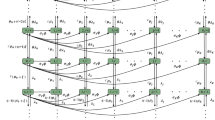Abstract
We analyzed an M/M/R queueing system with finite capacity N where customers have multiple classes with no priorities under steady-state conditions. It is assumed that any one class of arriving customer is serviced by one or more servers, and that each customer class has equal probability of service. Analytic explicit solutions are obtained with the assumption of exponential distributions for arrival times and service times. A cost model is developed to determine the optimal system capacity and the optimal number of servers. The minimum expected cost, the optimal system capacity, the optimal number of servers, and various system performance measures are obtained for three customer classes and four customer classes, based on assumed numerical values given to the designated system parameters.
Similar content being viewed by others
References
Gross D, Harris CM (1998) Fundamentals of queueing theory, 3rd edn. Wiley, New York
Kleinrock L (1975) Queueing systems, vol I: theory. Wiley, New York
Tijms HC (1986) Stochastic modelling and analysis: a computational approach. Wiley, New York
Benson F, Cox DR (1951) The productivity of machines requiring attention at random interval. J R Stat Soc B 13:65–82
Elsayed EA (1981) An optimum repair policy for the machine interference problem. J Oper Res Soc 32:793–801
Wang K-H (1994) Profit analysis of the machine repair problem with cold standbys and two modes of failure. Microelectron Reliab 34:1635–1642
Wang K-H, Wu J-D (1995) Cost analysis of the M/M/R machine repair problem with spares and two modes of failure. J Oper Res Soc 46:783–790
Wang K-H, Lee H-C (1998) Cost analysis of the cold-standby M/M/R machine repair problem with multiple modes of failure. Microelectron Reliab 38:435–441
Wang K-H, Ke J-B, Pearn WL (in press) Optimal management for a finite M/M/R queueing system with two arrival modes. Int J Adv Manuf Technol
Robertazzi TG (2000) Computer networks and systems-queueing theory and performance evaluation, 3rd edn. Springer, Berlin Heidelberg New York
Hilliard JE (1976) An approach to cost analysis of maintenance float systems. IIE Trans 8:128–133
Author information
Authors and Affiliations
Corresponding author
Rights and permissions
About this article
Cite this article
Wang, KH., Chen, CH. & Ke, JC. Optimal management of a finite M/M/R queueing system with multiple customer classes. Int J Adv Manuf Technol 36, 188–194 (2008). https://doi.org/10.1007/s00170-006-0816-8
Received:
Accepted:
Published:
Issue Date:
DOI: https://doi.org/10.1007/s00170-006-0816-8




